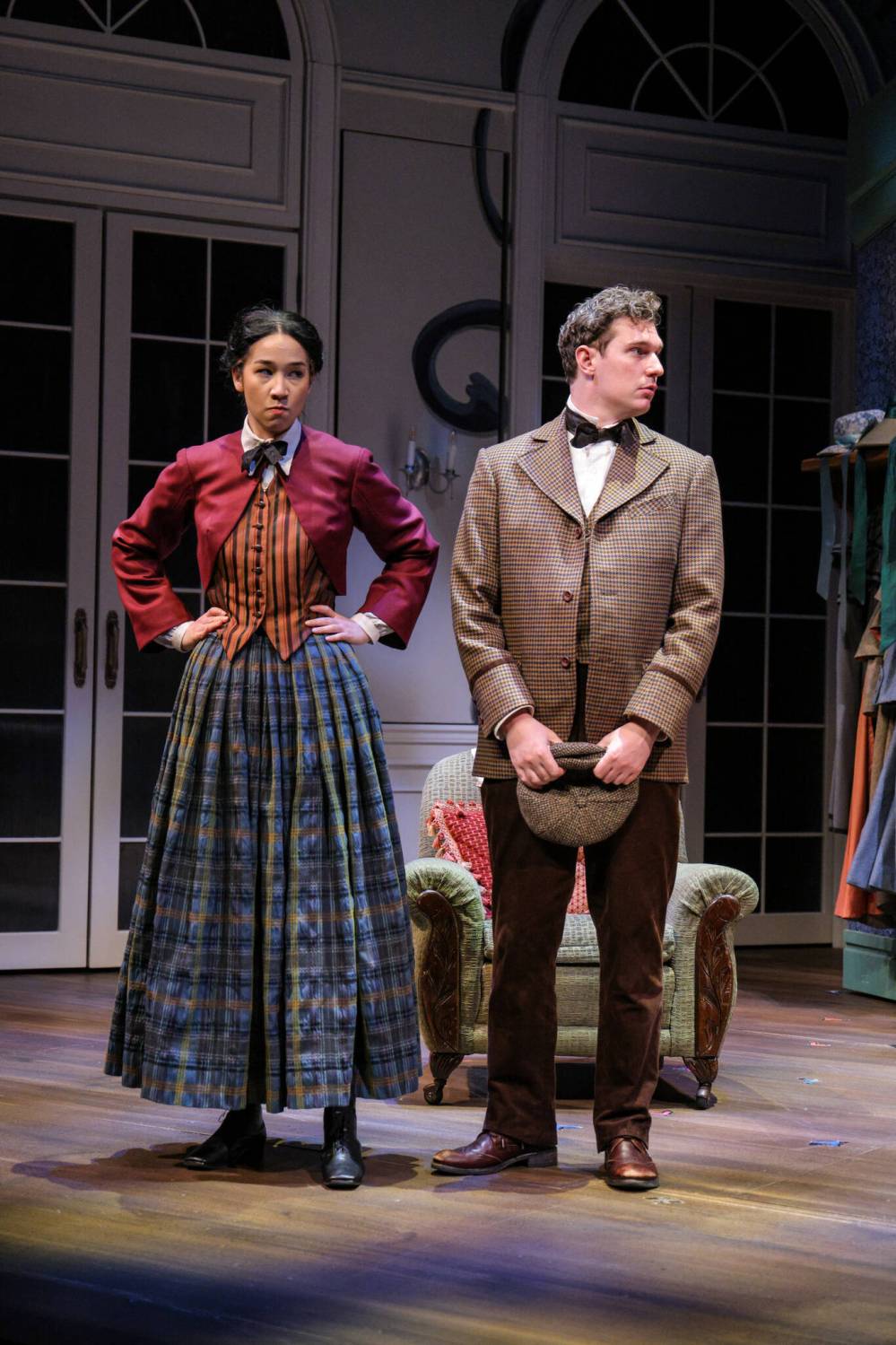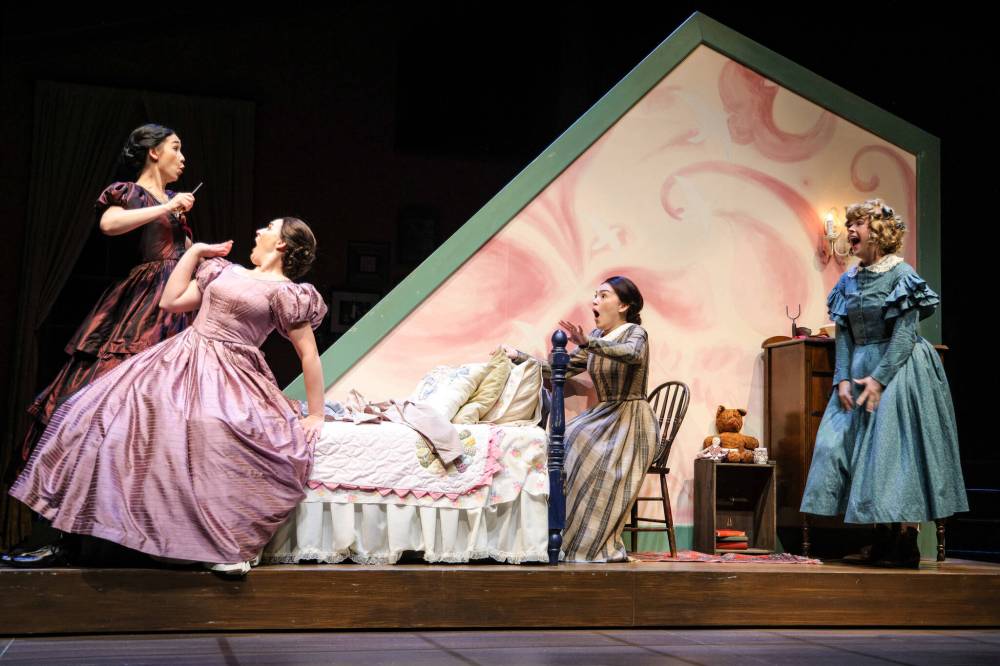Long-suffering sisters
Louisa May Alcott adaptation lacks mastery, misses magic of iconic novels
Advertisement
Read this article for free:
or
Already have an account? Log in here »
To continue reading, please subscribe:
Monthly Digital Subscription
$0 for the first 4 weeks*
- Enjoy unlimited reading on winnipegfreepress.com
- Read the E-Edition, our digital replica newspaper
- Access News Break, our award-winning app
- Play interactive puzzles
*No charge for 4 weeks then price increases to the regular rate of $19.00 plus GST every four weeks. Offer available to new and qualified returning subscribers only. Cancel any time.
Monthly Digital Subscription
$4.75/week*
- Enjoy unlimited reading on winnipegfreepress.com
- Read the E-Edition, our digital replica newspaper
- Access News Break, our award-winning app
- Play interactive puzzles
*Billed as $19 plus GST every four weeks. Cancel any time.
To continue reading, please subscribe:
Add Free Press access to your Brandon Sun subscription for only an additional
$1 for the first 4 weeks*
*Your next subscription payment will increase by $1.00 and you will be charged $16.99 plus GST for four weeks. After four weeks, your payment will increase to $23.99 plus GST every four weeks.
Read unlimited articles for free today:
or
Already have an account? Log in here »
Hey there, time traveller!
This article was published 22/11/2024 (362 days ago), so information in it may no longer be current.
The Royal Manitoba Theatre Centre popped open an early Christmas cracker Thursday night, unveiling its feel-good holiday classic, Little Women.
A 14-member, all-local cast performs the Manitoba première of Jordi Mand’s 2022 stage adaptation of Louisa May Alcott’s autobiographical novel Little Women and its sequel Good Wives, squashed together into a single volume chronicling the lives of four close-knit sisters during the time of the American Civil War.
Set in Concord, Mass., with the action beginning Christmas Eve, the story follows plucky protagonist and aspiring 16-year-old writer, Josephine (Jo) March — a thinly disguised Alcott — who rails against repressive societal norms in which women were relegated to becoming solely wives and mothers, ignoring the whispers of their own creative, searching hearts.

LEIF NORMAN PHOTO
Bailey Chin and Matthew Fletcher
It’s a potent theme that holds as true today as it did when the American writer first penned her tales in 1868-69, and one wants to really, really like this warm-hearted show.
We follow the lives of its four lead characters, the March family’s “little women:” Jo, Beth, 15, Amy, 14, and Meg, 17, carefully tended to by their beloved mother, “Marmee,” as each discovers her unique path towards vaguely defined concepts of womanhood.
However, here’s the rub: an engaging theatrical production requires an alchemic blend of effective, sensitive casting; imaginative stage direction; and a compelling script in which the whole becomes much greater than the sum of its parts. This ambitious production often felt as loose as unbaked plum pudding.
Having said that, standout performances include Megan Fry in her RMTC debut, consistently lighting up the stage like a Christmas bauble as the art-loving Amy, blossoming before our eyes from a petulant, foot-stomping teen (who spitefully burns Jo’s hand-written novel) to a worldly artiste following her heart to Paris.
Another is Julia Davis as the fragile Beth, who actually does play Chopin as well as Christmas carols on her piano (snippets from Schumann’s Scenes from Childhood laced throughout sound designer Ashley Au’s classically-based score are a nice touch) before her heartbreaking death from scarlet fever in Act 2.
Ava Darrach-Gagnon likewise traverses an emotional arc as the sensible, upwardly mobile Meg, who ultimately discovers happiness as a wife and mother after marrying tutor Mr. John Brooke (Simon Miron).
Ironically, the weakest link is Bailey Chin, given the unenviable task of balancing Jo’s rebellious streak with a softer, more human side in which we feel for her character — the holy grail of stagecraft. The latter quality is best represented through a series of interwoven monologues in which she shares her ambitions and aspirations, as well as her own war against suffocating, misogynistic attitudes of the late 19th century.
Despite her gung-ho conviction, however, Chin’s portrayal feels uncomfortably one-dimensional throughout, and even cardboard-like at times, with physical mannerisms more at home in 2024 than the 1860s. Her rapid-fire barking out of lines, surely intended to be spirited, does not allow greater emotional depth to fully register and settle.
More responsive counterpoint, pregnant pauses and, by extension, greater dramatic tension, would have made this a more compelling and relatable performance.
Several of the narrative’s “big moments” are simply glossed over, including the death of sweet Beth and the stumbling marriage proposal from Laurie (Matthew Fletcher), as the entire cast whips through the highly episodic show with scarcely a moment to breathe.
Effective stage direction would have helped mitigate this, with Katie German — who appeared as an actor on this same stage in The Sound of Music, Into the Woods and The Rez Sisters — marking her RMTC directorial debut.

LEIF NORMAN PHOTO
From left: Bailey Chin, Ava Darrach-Gagnon, Julia Davis and Megan Fry perform as the March sisters in RMTC’s production of Little Women.
Even some of the play’s earlier scenes, in which the sisters create mini-plays, egged on by Jo, don’t ring true and lack joy. They feel more about getting lines out than creating a sense of playful spontaneity.
Amid all this bah humbug, bravo to veteran Winnipeg actor Jan Skene for her pitch-perfect, long-suffering matriarch “Marmee,” who contains her own simmering rage at the world’s injustices, as well as the charismatic Rodrigo Beilfuss (doubling as a bandaged Pastor March returning home from army service) for crafting Jo’s intellectual equal, the stereotype-free Professor Friedrich Bhaer who woos — and wins — her heart.
Fletcher’s feckless Laurie (a.k.a. “Teddy”) is wholly believable, while the riveting Tracey Nepinak nearly steals the show every time she appears as crusty Aunt March, single-handedly creating a world of subtext along with her pet parakeet.
This production boasts strong visual appeal, including sumptuous period frocks and suits denoting class structures designed by costumer Joseph Abetria, with malleable set pieces by Jawon Kang morphing into multiple locales. Hugh Conacher’s spot-on lighting includes nifty gobo effects, with ballroom choreography created by Rachael McLaren.
One final note: this is a long show, clocking in at a full 170 minutes (including intermission); it becomes exhausting by the end.
As the latest addition in an ever-evolving series of stage and screen adaptations of Alcott’s classic — Greta Gerwig’s 2019 film taking viewers on the most adventurous ride — Mand’s copiously detailed play, premièred by the Stratford Festival in June 2022, often loses sight of the forest for the trees, crying out for further whittling while also strangely omitting some of the novel’s most iconic, beloved lines.
Jo, who makes good on her promise to “do something extraordinary with my life,” achieving her dream of becoming a professional writer by the play’s end, would surely agree.
holly.harris@shaw.ca
History
Updated on Sunday, November 24, 2024 1:21 PM CST: Corrects Meg's age



